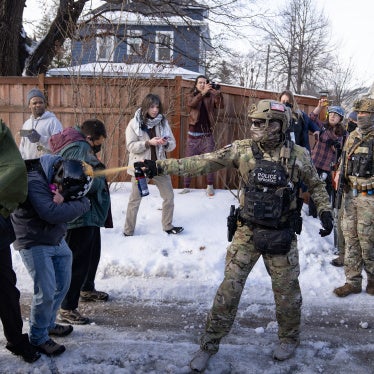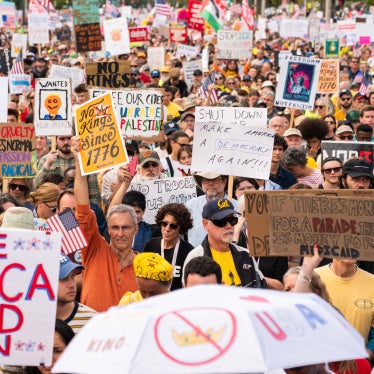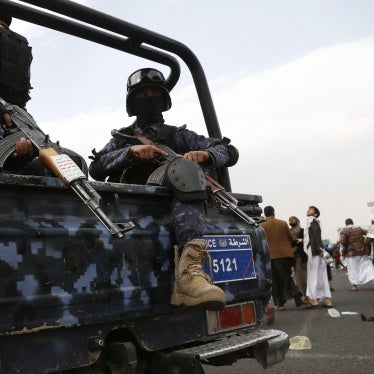News outlets have recently reported that the Department of Justice will release new guidance on the use of racial profiling by federal law enforcement officers shortly. Human Rights Watch wrote to US Attorney General Holder and urged him to ensure the new guidance abolishes exemptions for national security and border integrity operations and that it covers all federal law enforcement agencies.
December 3, 2014
The Honorable Eric Holder, Jr.
Attorney General of the United States
Department of Justice
950 Pennsylvania Ave, NW
Washington, DC 20530-0001
Dear Attorney General Holder:
We are encouraged by reports that the Department of Justice intends to modify guidance prohibiting racial and other discriminatory profiling by federal law enforcement agents (the “guidance”). We write to urge you to include three important reforms in the guidance: 1) eliminate the national security exemption; 2) eliminate the border exemption, and 3) ensure that the revised guidance applies to all law enforcement agencies within the federal government.
With regard to our first two suggested reforms, as you know, the existing guidance prohibits the invidious use of race and ethnicity in traditional law enforcement activities but allows law enforcement officers to consider race or ethnicity to the extent permitted by the Constitution and domestic laws in two broad areas: when protecting national security (the “national security exemption”) and border integrity (the “border exemption”).
We are encouraged by reports that you intend to revise the guidance to include religion and national origin in the definition of profiling, and that you intend to eliminate the national security exemption, which should mark the end of harmful community mass profiling.[1] We recommend adding to these important revisions a full repeal of the border exemption.[2]
By revising the guidance in this way, the Department of Justice would bring the United States into better compliance with the requirement under international human rights law that states shall not engage in racial discrimination. In accordance with US obligations under the International Convention on the Elimination of All Forms of Discrimination, ratified by the United States in 1994, the United States must not make distinctions that have the “purpose or effect” of nullifying or impairing equal protection of the laws and enjoyment of rights.[3] Current interpretation of the Equal Protection Clause in the US Constitution, however, does not rise to this standard. To establish a violation of the Equal Protection Clause based on discriminatory law enforcement, a plaintiff must at minimum show either intentional discrimination or an adverse effect driven by some form of discriminatory animus on the part of law enforcement officials.[4]
The guidance currently in effect for federal law enforcement officers in “traditional law enforcement activities” is more protective than these constitutional interpretations in line with international law.[5]
However, the current national security and border exemptions in the guidance allow agents working under them to adhere only to current constitutional precedent. It is for this reason that reforms to the guidance should end both of these exemptions.
With regard to our third recommended reform, we urge you to ensure that the revised guidance continues to apply to all law enforcement agencies within the federal government, particularly the Department of Homeland Security. As you know, the Department of Homeland Security’s fiscal year 2015 budget request totals $38.2 billion and its components include US Customs and Border Protection (CBP), US Coast Guard, US Immigration Customs Enforcement (ICE), the Federal Emergency Management Agency, the Transportation Security Administration, and the US Secret Service, among others.[6] The US government spends more on two of these sub-agencies, CBP and ICE, than on all its other principal criminal federal law enforcement agencies combined.[7]
Human Rights Watch has been monitoring reports of alleged racial profiling by CBP, including the Border Patrol. One of the problems with potentially exempting law enforcement involved in protecting the integrity of US borders or the Department of Homeland Security itself from the profiling guidance is the extent to which CBP is engaged in “border” enforcement far from actual international borders or ports of entry. Border agents are authorized under the law to make warrantless stops a “reasonable distance,” from the border defined under 1950s-era regulatory interpretation, as 100 air miles.[8] This means that CBP agents operate far from the actual border or far from the most active migration routes in the southern border and deep in American communities. Indeed, Human Rights Watch analyzed CBP data provided to us under the Freedom of Information Act from fiscal years 2011 and 2012 and found that nearly 30 percent of CBP’s 700,000 apprehensions in those years occurred between 15 and 100 miles from any land or sea border, and about 3 percent or 40,000 apprehensions occurred over 100 miles. This is consistent with a recent investigation by the Austin American Statesman finding that CBP agents apprehended more than 40,000 subjects between 2005 and 2013—an average of more than 10 apprehensions per day—at Texas’ nine most inland Border Patrol stations representing locations as far as 350 miles from Mexico.[9]
Recently, a number of lawsuits have alleged that CBP agents on “roving patrol” racially profile residents of border regions. In Washington State, the agency settled a 2012 lawsuit that accused the Border Patrol of failing to establish reasonable suspicion before stopping drivers in the Olympic Peninsula and seemingly making decisions to stop people “based on nothing other than the ethnic and/or racial appearance of a vehicle’s occupants.”[10] In Ohio, a currently pending suit alleges that the Border Patrol in the Sandusky Bay Station near Lake Erie “patrol the area for suspicious persons with a deliberate focus on Hispanic persons.”[11] Several legal challenges to Border Patrol profiling practices are also pending in Texas.[12]
Many of these lawsuits deal with US citizens and authorized residents affected by profiling. Human Rights Watch has documented several such cases as well. For example, Peter Mares is a US citizen of Mexican origin living in Sodus, New York, more than 22 miles from the US border with Canada through Lake Ontario. Mares, an outreach worker for a non-profit organization serving migrant workers, told Human Rights Watch that he believes he was racially profiled by US Border Patrol agents after responding, as a courtesy, to a request from local police for him to help translate for a Mexican woman in April 2010. Local police also called the Border Patrol for assistance and, upon arrival, Border Patrol agents began to interrogate Mares and asked him to produce identification. Shocked by this request, Mares explained he was a US citizen and asked why he needed to carry identification. In response, the Border Patrol agent forcibly handcuffed Mares, holding him restrained sitting on the ground for 45 minutes on one of the main streets of the small town.[13] “You can’t even describe the feeling,” Mares said of the experience, “it’s like your entire life, stepped on.”[14] Mares made a complaint to CBP about his treatment but four years later has received no response.
In Arizona, Human Rights Watch spoke with Carlotta Wray, a US citizen of Mexican origin who travels through an interior CBP checkpoint more than 25 miles from the border on a regular basis, where she believes she is racially profiled and subjected to additional questioning. “They always treat me like I just walked across the border,” she said.[15] A 19-year-old of Mexican origin with temporary legal status through the Deferred Action for Child Arrivals (DACA) program described feeling targeted by Border Patrol collaborating with New York State troopers. He told Human Rights Watch he was stopped on New York State Highway 104 at a sobriety checkpoint staffed by New York State troopers and Border Patrol agents on his way back from seeing a school play in Wayne County, New York in March 2014. “While we were stopped I saw 10 cars pass by and be waved through,” he said. “Nine of the drivers were white and another was African-American.” The young man was released after Border Patrol agents questioned him about his legal status. Still, he added, “they want to treat us like we’re ‘less than’ [others].”
As you have stated, racial profiling undermines the relationship between communities and law enforcement and causes real harm to those affected. Though the extensive operations of the Department of Homeland Security include border control activities directly at international boundaries they also comprise expansive enforcement activities throughout a wide swath of American communities. New Justice Department guidance should reflect this reality and the real harms of profiling by federal border control officials by ensuring the elimination of the national security and border exemptions and the applicability of the guidance to all federal law enforcement agencies.
We thank you again for your attention to our concerns and look forward to your response.
Sincerely,
Antonio M. Ginatta
Advocacy Director, US Program
Human Rights Watch
CC: Secretary Jeh Johnson, Department of Homeland Security
[1] See Human Rights Watch and Columbia Law School Human Rights Institute, “Illusion of Justice: Human Rights Abuses in US Terrorism Prosecutions,” July 2014, available at https://www.hrw.org/sites/default/files/reports/usterrorism0714_ForUpload....
[2] See our previous letter to you on this subject, Human Rights Watch letter to Attorney General Holder, April 21, 2014, available at https://www.hrw.org/news/2014/04/21/us-end-discriminatory-community-profi....
[3] International Convention on the Elimination of All Forms of Racial Discrimination (ICERD), 660 U.N.T.S. 195, entered into force Jan. 4, 1969 (ICERD in article 1 defines “racial discrimination” as “any distinction, exclusion, restriction, or preference based on race, colour, descent, or national or ethnic origin which has the purpose or effect of nullifying or impairing the recognition, enjoyment or exercise, on an equal footing, of human rights and fundamental freedoms in the political, economic, social, cultural, or any other field of public life” (emphasis added)).
[4] Brown v. Oneonta, 221 F.3d 329, 337 (2d Cir. 1999) (citing Vill. Of Arlington Heights v. Metro. Hous. Dev. Corp., 429 U.S. 252, 264–65 (1977)); Johnson v. Wing, 178 F.3d 611, 615 (2d Cir. 1999).
[5] DHS training documents on the profiling guidance now in effect read, “This Guidance in many cases imposes more restrictions on the consideration of race and ethnicity in federal law enforcement than the Constitution requires.” The training documents define invidious as “1. Causing or tending to cause animosity, resentment, or envious dislike; 2. Calculated to excite ill will or resentment or give offense, hateful.” available at http://www.dhs.gov/xlibrary/assets/training/xus/crcl/racelawofficers/Gui...
[6] US Department of Homeland Security, Budget in Brief, Fiscal Year 2015, available at http://www.dhs.gov/sites/default/files/publications/FY15BIB.pdf;
US Department of Homeland Security, Department Components, available at http://www.dhs.gov/department-components.
[7] Total spending for the Federal Bureau of Investigations, the Drug Enforcement Administration, the Secret Service, US Marshals Service and the Bureau of Alcohol, Tobacco, Firearms and Explosives stood at $14.4 billion in fiscal year 2012. Doris Meissner, Donald M. Kerwin, Muzaffar Chishti and Claire Bergeron, Immigration Enforcement in the United States: the rise of a formidable machinery, Migration Policy Institute, January 2013, available at http://carnegie.org/fileadmin/Media/Image_Galleries/immigration_enforcem...
[8] Immigration and Naturalization Service, Field Officers; Powers and Duties, 22 Fed. Reg. 9765, 9808 (Dec. 6, 1957) (codified at 8 C.F.R. § 287.1 (2012)).
[9] Jeremy Schwartz, “Border Patrol Makes Many Arrests Deep in the Heart of Texas,” Austin American Statesman, November 1, 2014, available at http://www.mystatesman.com/news/news/border-patrol-makes-many-arrests-de....
[10] Jose Sanchez, et al. v. U.S. Office of Border Patrol, et al., No. 2:12-cv-00735 (W.D.Wa. filed April 26, 2012).
[11] Muniz v. Gallegos, No. 09-02865 (N.D. Ohio. filed Dec. 10, 2009).
[12] Jaimes v. Harris, et al. No. 3:13-CV-01040-P (N.D. Tex., filed Mar. 12, 2013); Hernandez-Carranco v. U.S.A., et al. No. 3:12-CV-05186 (N.D. Tex., filed Dec. 19, 2012); Daniel Frias v. United States Customs and Border Protection Officer Arturo Torrez, et al., No. 3:12-CV-1296-B (N.D. Tex., filed Apr. 26, 2012).
[13] Annette Jiménez, “La Casa director handcuffed,” El Mensajero Catolico, May 11, 2010, available at
http://en.elmensajerorochester.com/news/local/la-casa-director-handcuffed/.
[14] Human Rights Watch interview with Peter Mares, Sodus, New York, June 11, 2014.
[15] Human Rights Watch interview with Carlotta Wray, in Arivaca, Arizona, March 11, 2014. See also People Helping People, Checkpoint Monitoring Data, October 28, 2014, available at http://phparivaca.org/?p=567.








